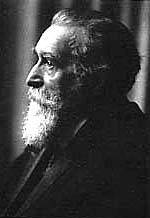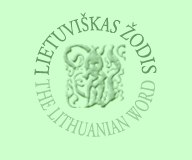
Jonas Basanavicius
(November 23, 1851, Ozkabaliai - February 16, 1927, Vilnius). Ideologist
of Lithuanian national movement, the founder (in 1883) and editor of the first
prohibited newspaper of national revival Ausra (The Dawn). One of the
initiators and the Chairman of the Organizing Committee of the 1905 Congress of
Lithuanians, the Great 'Seimas' of Vilnius. Jonas Basanavicius initiated the
foundation of Lithuanian Science
Society in 1907 and was proclaimed its Chairman. He edited the continuing
publication of the Society Lietuviu tauta (The Lithuanian Nation). In
1917-1918 he took part in the activities of Lithuanian Council, was the Chairman
at the Council's meeting during which the Act of February 16th, declaring the
independence of Lithuania, was signed. He made research
studies on Lithuanian history and culture, and collected data on folklore.
He wrote about 40 works on history, archaeology, cultural history,
ethnography, folklore studies, linguistics and medicine.
- BIOGRAPHY:
Jonas Basanavicius was the most
significant figure of the national Renaissance of Lithuania at the end
of 19th century and had acquired the name of the patriarch of the
nation. Although he never created any work of fiction, his
patriotic activities and his collections of folklore as well as
research had left a deep impact on the poetry and other writings of
that time.
- Basanavicius was born in Ozkabaliai
village, Vilkaviskis district. In 1866-1873 he studied in
Marijampole gymnasium, in 1873 he entered Moscow University, the
Faculty of History and Philology. In 1874 he was transferred to
the Faculty of Medicine. At the same time he had studied
Lithuanian history and archeology, collected Lithuanian folklore, was
concerned about the ceasing od the Lithuanian press prohibition, and published
popular books. In 1879 he was awarded the diploma of a medical doctor
and worked for some time in Ozkabaliai, Vilkaviskis, and Aleksotas.
In 1878 he accepted an appointment as a doctor and the head of a hospital
in Bulgaria, Lom Palanka city. He took care of Lithuanian
affairs, and searched for opportunities to publish a Lithuanian
newspaper abroad. In 1883 a newspaper Ausra ("The
Dawn") appeared which was edited and published by him. In
1882 Dr. Basanavicius left Bulgaria for Prague and Vienna where he
worked and studied medicine.
- In 1884 he returned to Bulgaria and
worked in the town Elena, in 1885 he moved to Lom Palanka. From 1892
he was appointed the head doctor of the Therapeutical department of
Varna hospital. In 1899-1903 he represented the Democratic party of
Bulgaria in Varna City Council and Varna Democratic party in the
Congresses in 1903 (Sofia), and 1905 (Adrianopol and Konstantinopol).
- In 1905 he returned to Lithuania and
settled down in Vilnius. Basanavicius was an initiator of the
Lithuanian Seimas (Parliament) in Vilnius, a creator of a
national Lithuanian democratic party, searched for opportunities to
start publishing a newspaper for Lithuania abroad. During the years of
German occupation he took part in common Lithuanian activities,
collected material for the history of occupation. In 1917 he was
elected a member of Lithuanian Council in Lithuanian Conference.
On February 16, 1918, he signed the Declaration of Independence.
- Basanavicius died on November 16, 1927,
and was buried at Rasos cemetery, Vilnius.
Properly:

